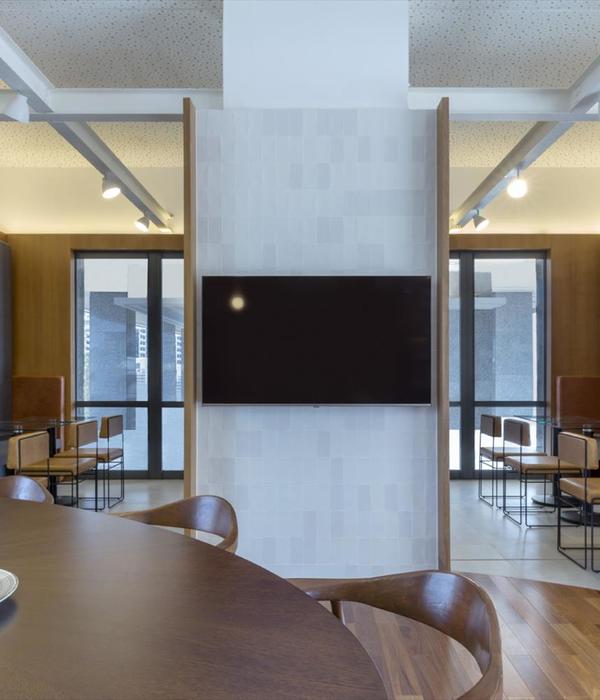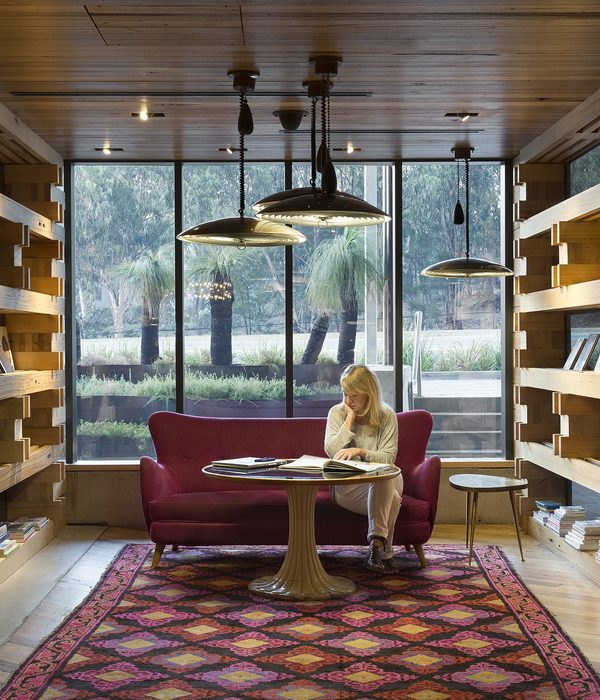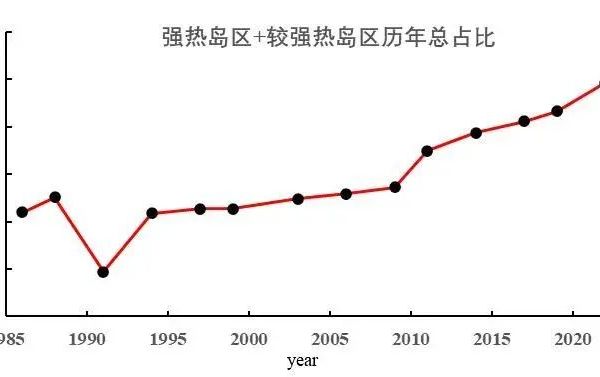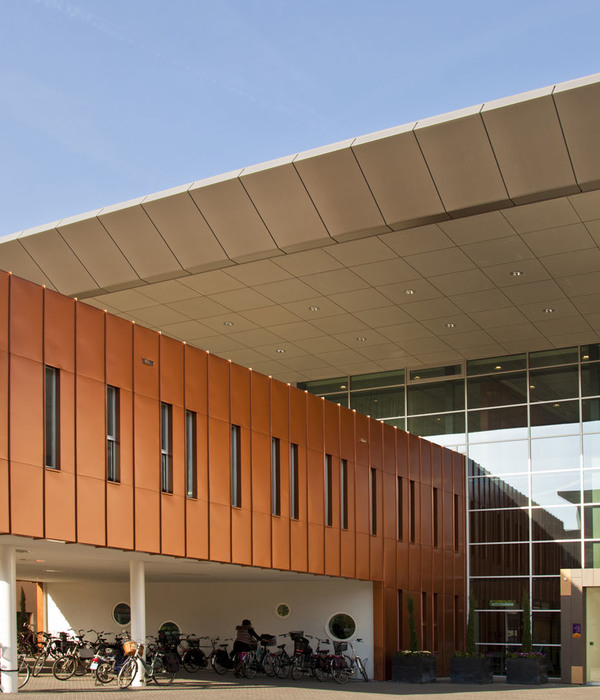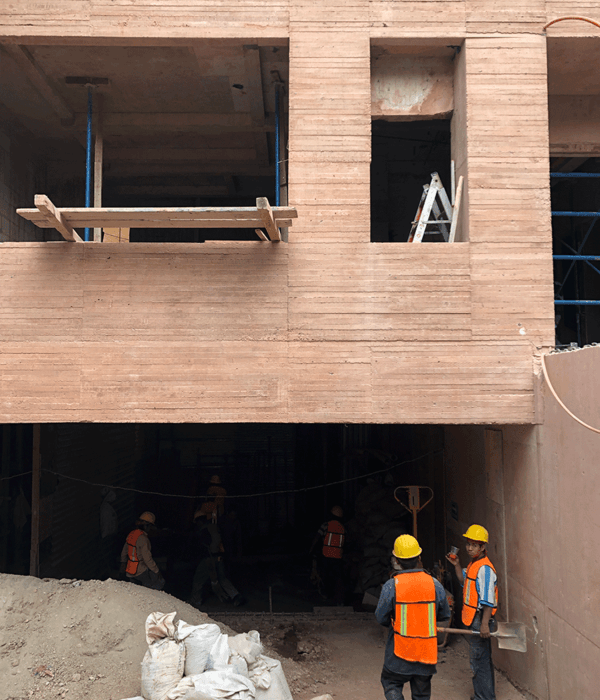为使用者带来舒适体验是黎巴嫩美国大学和建筑师的共同目标,最终营造出柔和的光线与宁静的氛围、全楼层无障碍设施、室内外相连的视野、丰富的内外学习空间以及由本地工匠专门定做的人体工程家具。
露天剧场上方的混凝土墙展示了四种朱拜勒地区使用过的历史悠久的字母表。设计中融入了从当地类型学中汲取的被动式思考:受Mashrabiya启发的双层外表皮为建筑带来阴凉、通风与柔光,开放的中庭形成了一个烟囱风口;下沉花园将光线与空气引入底层宽阔的图书馆空间;将建筑与岩石分离,能够让地中海的微风拂过露天剧场与咖啡厅。自然通风与采光配合太阳能光伏板的设计大幅度降低了对黎巴嫩稀缺电能的依赖和消耗。
▼通风分析图,Digram of ventilation ©Atelier Pagnamenta Torriani
▼室内概览,Overview of the interior ©Bahaa Ghoussain
Above the amphitheater a concrete wall displays the carvings of four alphabets historically used in the immediate Jbeil region. Passive features inspired from the local typology are incorporated into the design: the double outer skin, Mashrabiya inspired, allows for shading, ventilation, and light diffusion, and the main open atrium acts like a chimney vent; the sunken garden brings light and air in the large lower library level; detaching the buildings from the rock allows the Mediterranean sea breeze to circulate and ventilate the outdoor amphitheater and café areas. The solutions for natural ventilation and natural light team up together with photovoltaic solar panels to greatly reduce the reliance on and consumption of electrical energy, a scarce commodity in Lebanon.
▼室内概览,Overview of the interior ©Bahaa Ghoussainy
▼公共空间,Public spaces ©Bahaa Ghoussainy
图书馆与其附属空间满足学术活动和社会活动双重需求,同时也为多样的学生活动与信息交流形式提供公共空间:这是一个促进交流、沟通、学习和互相理解的包容性空间。
The library and ancillary spaces create synergy among scholarly activities and social life, while providing common ground for diverse student activities and forms of information: an inclusive space for exchange, communication, learning, and understanding.
▼图书馆,The library ©Bahaa Ghoussainy
▼功能分析图,Diagram of programs ©Atelier Pagnamenta Torriani
The wellbeing of the users, the main goal of both the Lebanese American University and the architects, is overall enhanced by the diffused light and serene atmosphere, accessibility at all levels, the continuous views to the exterior, the ample choice of study spaces inside and outside, and the custom-designed, ergonomic furniture crafted by local artisans.
▼模型,Models ©Atelier Pagnamenta Torriani
▼总平面图,Masterplan ©Atelier Pagnamenta Torriani
▼剖面图,Sections ©Atelier Pagnamenta Torriani
▼立面图,Elevations ©Atelier Pagnamenta Torriani
Both the library and the administration buildings are placed adjacent to the excavated rock, forming an open amphitheater, an unexpected inviting space, with the rock as a backdrop, juxtaposing the natural with the man-made.
▼建筑概览,Overview of the building ©Bahaa Ghoussainy
The Lebanese American University commissioned Atelier Pagnamenta Torriani to design a new Library and a Central Administration building on its Byblos Campus —above the city of Jbeil (or Byblos) where the Phoenicians codified the world ’s first phonetic alphabet.
▼建筑鸟瞰,Aerial view of the building ©Bahaa Ghoussainy
比布鲁斯校区给人的第一印象是场地上方被挖掘出的岩石与光秃秃的山体。因此,裸露的沉积岩和该地区层次丰富的历史成为了APT主要的设计灵感来源。另一个灵感来源于要面对黎巴嫩室外强光的挑战,使光线柔和地分散至室内中。
▼室外空间,Outdoor spaces ©Bahaa Ghoussainy
The excavated rock and the bare mountain above the site were the first impressions while visiting the Byblos Campus area. Thus the exposed sedimentary rock and the complex, stratified history of the region became the main inspiration for APT’s design. Another source of inspiration was the challenge of embracing Lebanon’s powerful light in full while softening it for diffused interior illumination.
▼建筑局部,Partial close-up ©Bahaa Ghoussainy
图书馆和行政中心毗邻被挖掘的岩石,形成了一个露天剧场,这里意外舒适,以岩石为背景,呈现出自然与人工并存的空间。
▼露天剧场,Outdoor amphitheater ©Bahaa Ghoussainy
黎巴嫩美国大学委托Atelier Pagnamenta Torriani在其比布鲁斯校区设计了一座新图书馆及行政中心,该校区位于朱拜勒或比布鲁斯市(Jbeil or Byblos)上方,腓尼基人在这座城市编撰了世界上第一版音标字母表。
▼剧场特写,Close-up of the amphitheater ©Bahaa Ghoussainy
建筑师设计了全新的动态结构和层次丰富的外部表皮,根据朝向为室内空间带来合理的阴凉与柔和光线。图书馆的室内空间围绕中庭展开,仿佛一个中央枢纽,光线与新鲜空气流动其中。
▼表皮分析图,Skin axonometric ©Atelier Pagnamenta Torriani
The new structures are conceived as dynamic forms and their exterior skins are layered, providing shade and optimizing diffused light inside according to the orientation. The interior spaces of the library are developed around a large atrium that acts like a hub, brings great luminosity, and allows for natural air circulation.
▼局部特写,Partial close-up ©Bahaa Ghoussainy
设计上,室外空间完美地与室内衔接,室内外两者之间形成紧密联系。室内空间是流动、开放、通透的。整个建筑诠释出虚实结合的理念。白天建筑外墙是不透明的,到了夜晚则变得更加通透。
In the design, the exterior spaces flow seamlessly inside, creating connectivity between the two. The interior spaces are fluid, open, and transparent. Throughout the project the contrast between solid and transparent is apparent. During the day, the building facades are opaque and become more transparent in the evening.
▼夜景,Night views ©Bahaa Ghoussainy
{{item.text_origin}}

